The Importance of Peer Support
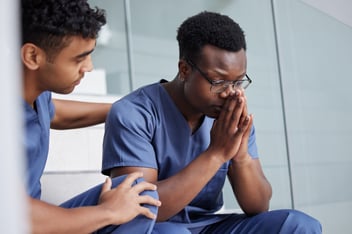
Kristi Wright sits down with Curi's Chief Medical Advisor, Dr. Carolyn Anctil, to discuss the importance of peer support programs when faced with a malpractice claim.
For physicians, the idea of facing a malpractice lawsuit is one of the most terrifying experiences imaginable. The anxiety, stress, and uncertainty alone are enough to keep them awake at night, and these feelings are only amplified by the isolation that they feel as many keep this experience quiet. It’s understandable why medical providers wouldn’t want to ever discuss such a topic, as there is often a sense of shame or guilt associated with being sued — even when the provider knows they have done nothing wrong. However, being named in a lawsuit is not nearly as uncommon as many might assume. In fact, according to Medical Economics, nearly one third of U.S. physicians have been sued at some point in their career. So, if you ever find yourself in this position, know that you are not alone.
When named in a suit, a physician’s first call is often to their medical malpractice insurance carrier. At Curi, we recognize the emotional and mental toll this experience can take on our members and do our best to provide holistic support as their trusted partner. To that end, we take a three-prong approach to supporting our members. First, we have dedicated, experienced claims consultants who are here for you to guide you through the process. They attend first suit meetings, mediations, depositions, and are by your side at trial, answering questions you may have along the way. Second, we provide an experienced medical malpractice defense lawyer who will vigorously defend your care and work towards the best possible resolution. And finally, what I would like to discuss more with you today, is our Clinician Peer Support Program.
It's important that providers don’t internalize the negative emotions that may come up during a lawsuit. Your team has worked hard to develop a safe space for clinicians to discuss the emotional and physical toll of this experience. By speaking with peers who have faced similar circumstances, our members can feel better understood and more prepared to face difficult situations head on.
I recently sat down with Curi member and Chief Medical Advisor, Dr. Carolyn Anctil, to discuss her perspective on the importance of peer support, and here is what she shared:
Physician egos are often deeply entwined with their profession. They attend medical school with the goal of helping others. They take an oath promising to do no harm. So, when something goes wrong and a patient is harmed, physicians take the news to heart. Errors are inevitable, physicians are not superhumans; but they often feel personally responsible for patient outcomes. The pain and guilt of causing or being part of a medical error is significant. Doctors often feel inadequate, incompetent and can develop self-doubt. Being named as a defendant in a lawsuit causes additional shame, anxiety, and embarrassment for the most caring of physicians. A lawsuit is a prolongation of an already traumatic event.
Research demonstrates that talking to a peer about a significantly stressful event speeds recovery. Fortunately, Curi has a dedicated team of experienced physicians who have been involved in harm events or litigation themselves to provide support for doctors facing an active suit. Being involved in an adverse medical event doesn’t mean you’re a bad doctor, and Curi Peer Support helps to make the burdensome load of a lawsuit feel a little lighter.
During our conversation, Dr. Anctil also shared that she has personally witnessed the power of peer support in action. In each of her retellings, the provider in question was afraid to be vulnerable in front of partners, but found solace in the ability to have close, open, and compassionate discussions in a safe space through Curi’s Peer Support Program. For some providers, this simply gave them a safe space to vent fears and frustrations, and for others, it was a lifeline that gave them the courage they needed to return to work and continue practicing medicine.
The power of connection cannot be understated in difficult situations, and I’m proud to be able to offer members the opportunity to connect with one another in meaningful ways when support is needed most. If you have had a similar experience you’d like to share, I encourage you to please tell me more about it using the comments section below!
The opinions and views expressed in this blog post belong to and are solely those of the individual author, and do not necessarily reflect those of Curi Insurance or Curi Insurance’s parent or affiliated companies or their members, insureds, clients, customers, or partners.
The information and services provided in the Peer Support Program are intended for informational purposes only. They do not serve as a substitute for legal or medical advice or medical assessments or treatment. The program offerings do not constitute medical care, and no patient-provider relationship is established. If medical or legal services are needed, please seek out a professional.
About the Author
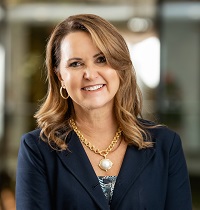


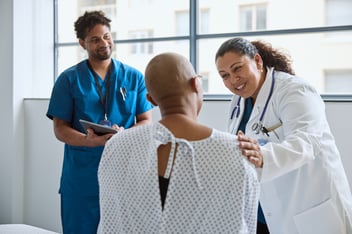
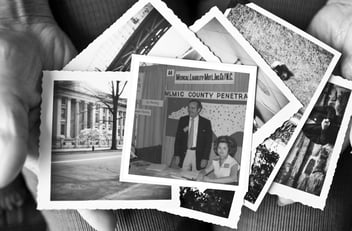
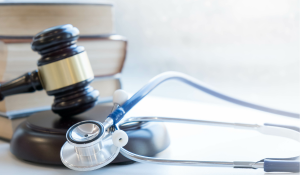
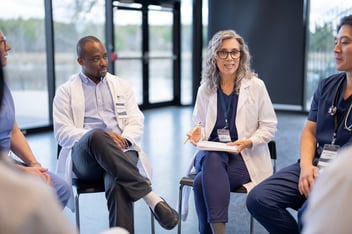



Comments